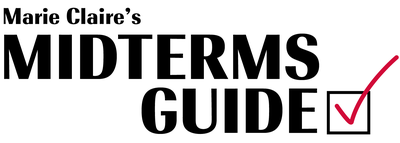Environmental Measures on the 2018 Midterm Election Ballots You Should Know About
A guide to what's on the ballot to protect the planet and its residents, big and small.

Earlier this month, humans received a dire report from the United Nations’ Intergovernmental Panel on Climate Change: Unless we drastically change our global economic habits immediately, we could see massive food shortages, cataclysmic weather events, a die-off of coral reefs, and rising sea levels by 2040—well within many of our lifetimes. It’s all because of climate change, and humans are to blame.
As much as it hurts to think about it—it feels like such a major obstacle to tackle—we are already witnessing the catastrophic effects of global warming, carbon pollution, and habitat destruction. And the current administration has been actively repealing what little measures we had in place to try to reverse some of the damage we’ve caused.
But there’s some good news: There are things you can do to stave off this climate change-related collapse of our resources. Sure, reversing some of the effects will require you to be responsible in your own personal life (here are some ways to do that), but ask an environmental expert what big-impact move you can make right now to help reverse climate change, and they'll tell you to vote. This is not a partisan issue. It's literally about human survival.
Fortunately, there are some important environmental protection measures on the ballots in the midterm elections this November. That means you could use your vote to tell the people currently running our country—who, you’ll recall, gleefully supported the rollback of important things like methane regulation, rules on coal power plants, endangered species laws, and even how much land national parks are allotted—just where they can stick their abysmal and self-destructive policymaking.
If you live in Rhode Island, Nevada, Georgia, or California, you’ll be able to vote on more money being allocated to various environmental causes. In Florida and Alaska, you can vote on measures that could protect animals. And if you live in Washington, you could have a voice on one of the most progressive environmental measures ever put up to a vote. Lucky you! But be warned: Lots of dark money is going into convincing you not to vote to protect the environment.
Here’s a breakdown of 10 critical measures and initiatives on ballots this November. Some help protect the environment, and some are poised to hurt it.
Washington Initiative 1631: Carbon Emissions Fee Measure
What is it?
Get exclusive access to fashion and beauty trends, hot-off-the-press celebrity news, and more.
A "yes" vote seeks to enact a $15 per metric ton of carbon emission fee on any big polluters starting January 1, 2020, and increasing by $2 per ton a year until the state’s emission goals are met.
Who’s into it?
Damn long-hairs, that’s who. Just kidding: It’s supported by politicians including Washington Governor Jay Inslee, businesses that range from solar energy to local brewing companies, a slew of nonprofit organizations (many of them local and national conservation groups), and even a bunch of healthcare organizations, like the American Lung Association and Planned Parenthood.
RELATED STORY

What’s notable?
Not only is it refreshingly demanding for an environmental initiative, but if adopted, Washington would be the first state ever to introduce a carbon tax through a vote. It’s a huge step in trying to reduce the amount of pollution that the U.S. produces. The Western Petroleum Association is one of the groups against the measure, duh.
How would a good environmentalist vote?
Yes on 1631.
Rhode Island Environment, Recreation, and Water Infrastructure Bond Measure
What is it?
A bill to allocate a bunch of state bond money—$47.3 million, to be precise—to things like bike trails, clean water management, and coastal protection and restoration.
Who’s into it?
There aren’t any official groups for or against it.
What’s notable?
The breakdown of where the money goes, which you can check out here, has made room for things like local recreation projects and infrastructure initiatives.
How would a good environmentalist vote?
Likely "yes."
North Carolina Right to Hunt and Fish Amendment
What is it?
This is a tricky one. The only thing this amendment would literally do, if passed, is add a line to North Carolina’s constitution that declares hunting and fishing a state constitutional right. There would be no immediate impact on people who already hunt and fish in the state, and proponents of the bill say that it would be helpful to “conservation.” (For what it’s worth, a lot of hunters consider themselves conservationists, but how that conservation manifests and whether it actually does that much for the species in question is often controversial.)
But this bill’s ramifications aren’t literal, but more symbolic. And you can tell because...
Who’s into it?
The National Rifle Association. They tend to be pretty awful as an organization, so anything they’re passionate about should raise eyebrows, no matter how innocuous it might seem.
What’s notable?
In an article in Asheville publication The Mountain Xpress, some senators expressed confusion about the amendment, since hunting and fishing don’t seem to be under attack in the state. Some Democratic senators in the same article suggest that the measure is really just a political motive in order to get “a certain demographic” to the voting booth (i.e., GOP base voters).
And since the GOP has put themselves largely in the anti-conservation group (see the fourth paragraph of this story), that’s probably not a good thing for the environment, in the long run.
How would a good environmentalist vote?
Probably a “no” on this amendment, mostly out of suspicion.

Nevada Question 6, Renewable Energy Standards Initiative
What is it?
If passed, it would require electric companies to get at least 50 percent of their energy from renewable sources by 2030.
Who’s into it?
A group called NextGen Climate Action, which works to get more renewable energy questions on ballots in Nevada and Arizona. Since Nevada receives some of the highest amounts of sunlight of any state in the country, Tom Steyer, founder of NextGen, has called it “the Saudi Arabia of renewable resources.”
Both Republican and Democratic congresspeople have come out in favor of the bill, as has the Sierra Club, the Natural Resources Defense Council, and Conservatives for Responsible Stewardship.
What’s notable?
Though plenty of people on both sides of the aisle are in support of the bill, its major opponent is Senator Don Gustavson, a Republican, who leads the Coalition of Energy Users.
For what it’s worth, the energy sector—groups like NV Energy, Newmont Mining, Keystone Corp. (of Pipeline infamy), and the Nevada Mining Association—are among his biggest campaign contributors.
Also notable is that a separate measure, Nevada Question 3, is about deregulating the energy market in Nevada. The backers of Question 6 have said, “We don’t have a dog in that fight.” And according to the Question 6 website, “Question 3 is about who provides your energy. No matter what happens with Question 3, we need Question 6. Voting YES on 6 is the only way to guarantee that utilities provide 50% renewable energy by 2030.”
How would a good environmentalist vote?
Yes on 6, meh on 3.
Arizona Proposition 127, Renewable Energy Standards Initiative
What is it?
Same deal as Nevada’s Question 6 (above), but instead of a blanket 50 percent renewable energy by a certain date, Arizona would require a certain percentage of energy to come from renewable resources starting at 12 percent in 2020 and increasing yearly to 50 percent in 2030.
Same deal, more specific timeline.
Who’s into it?
NextGen Climate Action and its founder Tom Steyer, who are also proponents of Question 6 in Nevada. The Nevada Democrats, the Sierra Club, the Natural Resources Defense Council, and Physicians for Social Responsibility are also among Prop 127’s proponents.
What’s notable?
The main opponent of Prop 127 is a group called Arizonans for Affordable Energy, which has received over $11 million from a group called Pinnacle West, the parent company of Arizona Public Service, the largest electricity provider in Arizona.
That's a lot of money! Really seems like the big electric company doesn’t want you to vote for this clean energy bill.
How would a good environmentalist vote?
Yes on Prop 127.
Georgia Amendment 1, Portion of Revenue from Outdoor Recreation Equipment Sales Tax Dedicated to Land Conservation Fund Amendment
What is it?
Though it won’t win any prizes for Catchiest Title, this proposed amendment to the state’s constitution basically does what it says on the label: A “yes” means that up to 80 percent of the sales and use tax on outdoor sporting equipment will go toward the Georgia Outdoor Stewardship Trust Fund.
The Best Political Swag to Buy for 2020
Who’s into it?
A group called the Georgia Outdoor Stewardship Coalition, which includes among others the Georgia Conservancy (a member-supported conservation organization in the state), The Nature Conservancy, Park Pride, and the Trust for Public Land.
What’s notable?
No financial contributions have been given to oppose this amendment.
How would a good environmentalist vote?
Yes on Amendment 1.
Florida Amendment 13, Ban on Wagering on Dog Races Amendment
What is it?
A “yes” vote would not only ban wagering on dog racing in Florida (including greyhound races, this amendment will have you know), but ban any dog races on which wagering occurs, effectively ending dog racing in the state.
And yeah, dogs count as the environment because they are animals who rely on us to protect them because they can't advocate for themselves. So there!
Who’s into it?
Protect Dogs—Yes on 13 is the main group behind the amendment, and according to their website, they’re “a grassroots campaign working to end the cruelty of greyhound racing in Florida.” The website also quotes the stat that a greyhound dies every three days in Florida because of racing-related injuries.
It’s got wide bipartisan support, from everyone from the Humane Society to Mike Huckabee.
What’s notable?
The amendment’s main opponent is called, confusingly, Protect Greyhounds, and cites as its mission, “Preserving the proud tradition of Florida greyhound racing and educating the public about these amazing athletes and pets.”
RELATED STORY

Among the members of this coalition is a kennel that supplies greyhounds to racing facilities in Florida, the Florida Chamber of Commerce, and a slew of Greyhound adoption organizations.
How would a good environmentalist vote?
Yes on 13.
California Proposition 6, Voter Approval for Future Gas and Vehicle Taxes and 2017 Tax Repeal Initiative
What is it?
In 2017, a tax was instated that sent money earned from various fuel taxes to infrastructure projects, like roadway repair. A “yes” vote on Prop 6 would not only repeal that tax, but would require residents to vote for any future tax increases that have to do with fuel and cars. (Right now in California, taxes can be increased with a 2/3 majority in the state legislature and a signature from the governor.)
Who’s into it?
Lots of Republicans who don’t like taxes of any kind, including Paul Ryan, who has discussed the importance of making infrastructure a top priority in the past. Supporting a bill that would get rid of a major source of funding for those projects just seems like a weird way to show that.
What’s notable?
Lots of people oppose Prop 6, including Governor Jerry Brown, a ton of municipalities in the state (check out the full list here), a slew of Democratic groups, the NAACP, bicycling advocates, and the Coalition for Clean Air.
The thing is, everyone hates paying taxes. No one wants to pay more than they already are, no matter how necessary it may be, and ain’t nobody showing up to an election (as Prop 6 would require) to say, “Yes papa, more taxes for me.”
The 2017 tax is already in effect, and taking it away would create losses for the state—money that was going to very necessary infrastructure projects—of up to $4.9 billion by 2020 or so.
How would a good environmentalist vote?
No on Prop 6.

California Proposition 12, Farm Animal Confinement Initiative
What is it?
A “yes” would ban the sale of meat if the animals providing it were confined below a specific number of square feet.
Who’s into it?
Lots of animal welfare groups support this proposition, including the Humane Society of the U.S., the Center for Biological Diversity, National Consumers League, and the Center for Food Safety. The Humane Society is the biggest donor to this proposition, on either side.
What’s notable?
The group against Prop 12 is called Californians Against Cruelty, Cages, and Fraud, which claims on its site that Prop 12 would actually reinstitute the smaller cages that California voters elected to outlaw in 2008 with Prop 2.
PETA, which defines itself as an abolitionist organization for animals, is against Prop 12, and called the measure “a step backward” in a blog post, since the proposed changes wouldn’t go fully into effect until 2022 and still don’t go far enough.
That said, the other big opponents of Prop 12 are the Association of California Egg Farmers, the National Pork Producers Council, and a group called the Humane Farming Association (HFA, the group behind the Californians Against Cruelty, Cages, and Fraud site)—which, the Humane Society points out, has been applauded by a cockfighting publication.
How would a good environmentalist vote?
Yes on 12. I hear what PETA is saying about Prop 12 not going far enough, but it’s an improvement on current conditions and it’s actually on the ballot right now. An alternative that provides even better treatment to animals, unfortunately, is not.
Alaska Ballot Measure 1, Salmon Habitat Protections and Permits Initiative
What is it?
This measure would rework the permitting process for projects that in any way might damage, pollute, or otherwise harm protected fish habitats.
Who’s into it?
Groups like the Commercial Fisherman’s Association say that salmon are more than just large and delicious fish that taste great with schmear. They’re ecologically important animals, capable of remembering detailed information about spawning grounds and making long journeys from streams to the open ocean. They’re an integral part of Alaska’s heritage.
What’s notable?
Here, it’s more interesting to look at who doesn’t like Measure 1: The initiative’s major opponent is a coalition called Stand for Alaska—No On One, which claims the measure threatens “jobs, the economy, and our communities,” according to their website. Also according to their website, oil and gas giants ConocoPhillips and BP Alaska are some of Stand for AK’s biggest backers—you know, that BP—which means they might have a skewed sense of what actually threatens jobs, the economy, and communities.
How would a good environmentalist vote?
Yes on 1.
The midterm elections will take place on November 6, 2018. To register, to check your registration, or to find your polling place, head over to Vote.org. There are other initiatives up for the vote this November too, so check your sample ballot and do some digging to see who’s behind what in your state.
Information about the above bills was pulled from Ballotpedia, a nonpartisan resource.

From explainers to essays, cheat sheets to candidate analysis, we're breaking down exactly what you need to know about this year's midterms. Visit Marie Claire's Midterms Guide for more.
RELATED STORIES


Cady has been a writer and editor in Brooklyn for about 10 years. While her earlier career focused primarily on culture and music, her stories—both those she edited and those she wrote—over the last few years have tended to focus on environmentalism, reproductive rights, and feminist issues. She primarily contributes as a freelancer journalist on these subjects while pursuing her degrees. She held staff positions working in both print and online media, at Rolling Stone and Newsweek, and continued this work as a senior editor, first at Glamour until 2018, and then at Marie Claire magazine. She received her Master's in Environmental Conservation Education at New York University in 2021, and is now working toward her JF and Environmental Law Certificate at Elisabeth Haub School of Law in White Plains.